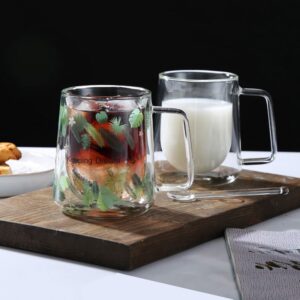Is it possible for the age-old craft of glassware production to lead the way in modern sustainability efforts? How can an industry rooted in tradition adapt to the pressing needs of environmental conservation? And what role does innovation play in reducing the carbon footprint of glassware manufacturing?
The glassware industry is indeed making strides towards sustainability by incorporating innovative technologies and practices. These efforts are aimed at reducing energy consumption, minimizing waste, and utilizing renewable resources. This transformation is not just about adapting to environmental regulations; it’s about pioneering a path that others can follow.
Let’s dive deeper into the ways glassware production is shaping a sustainable future.
The Carbon Dilemma in Glassware Production: Current Challenges and Causes
As we delve deeper into the sustainability of glassware production, it’s crucial to address the elephant in the room: carbon emissions. This aspect of production not only impacts the environment but also the industry’s efforts to adopt greener practices. Understanding the current carbon footprint of glassware manufacturing is essential for devising effective strategies to mitigate these emissions.
The production of glassware involves several energy-intensive processes, each contributing to the overall carbon emissions of the industry. The most significant of these is the melting process, where raw materials are heated to high temperatures to form molten glass. This step alone accounts for the majority of the industry’s energy use and, consequently, its carbon emissions. The reliance on fossil fuels for heating, traditionally coal and natural gas, exacerbates the carbon footprint.
Furthermore, the calcination of limestone, a key ingredient in glass production, releases significant amounts of carbon dioxide (CO2). This chemical reaction, essential for the creation of glass, adds to the environmental impact of the manufacturing process. Additionally, inefficiencies in older furnaces and equipment not only waste energy but also increase the CO2 output per unit of glass produced.
Transportation of raw materials and finished products also contributes to the carbon emissions associated with glassware. The global nature of the supply chain means that materials and products often travel long distances, leading to higher fuel consumption and emissions.
To address these challenges, the industry is exploring various avenues, such as improving furnace efficiency, transitioning to renewable energy sources, and incorporating more recycled glass into production. By tackling the root causes of carbon emissions, the glassware sector aims to not only reduce its environmental impact but also lead by example in the broader manufacturing industry.
In conclusion, the path to sustainability for the glassware industry is complex, with carbon emissions posing a significant challenge. However, by understanding and addressing the main sources of these emissions, there is a clear route towards a more sustainable and environmentally friendly production process. This journey is not only about reducing the industry’s carbon footprint but also about shaping a future where sustainable practices are at the core of manufacturing excellence.
Innovative Strategies for Carbon Emission Reduction in Glassware Production
In the quest for sustainability, the glassware industry faces the formidable challenge of reducing its carbon footprint. This necessity has sparked a series of innovative approaches aimed at minimizing environmental impact. The following strategies illuminate the industry’s commitment to eco-friendly practices and highlight the path toward greener production methods.
Energy Efficiency Improvement
The cornerstone of carbon reduction efforts lies in enhancing energy efficiency. By refining production techniques and modernizing equipment, the industry can achieve significant reductions in carbon dioxide emissions. This involves the adoption of advanced combustion devices and the meticulous redesign of furnaces to optimize energy use, thus setting a new standard for environmental stewardship in manufacturing.
Use of Clean Energy
Transitioning to clean energy sources marks a pivotal shift in the industry’s approach to carbon management. Embracing renewables such as solar and wind power not only curtails reliance on fossil fuels but also symbolizes a forward-thinking mindset in tackling climate change. This strategic pivot is instrumental in reshaping the energy landscape of glassware production.
Material Selection and Recycling
A nuanced understanding of material impact is essential for reducing the carbon footprint. Selecting low-carbon materials and championing recycling initiatives serve as key facets of this strategy. By reincorporating discarded glass into the production cycle, the industry not only conserves raw materials but also underscores the value of a circular economy.
Greenhouse Gas Management and Monitoring
Effective greenhouse gas management, coupled with rigorous monitoring, provides a framework for accountable carbon emission reduction. Through precise tracking and analysis, manufacturers can identify targeted interventions to lessen their environmental impact, demonstrating a pragmatic approach to ecological challenges.
Product Design and Optimization
Eco-conscious product design emerges as a critical component in the sustainability equation. By minimizing material use and enhancing the longevity and recyclability of products, the industry can significantly reduce resource depletion and waste, further contributing to environmental preservation.
Carbon Offsetting and Compensation
Engagement in carbon offsetting initiatives reflects the industry’s broader commitment to combating climate change. By investing in projects that reduce emissions elsewhere, glassware manufacturers can neutralize their carbon output, paving the way for a more sustainable future.
The glassware industry’s multifaceted approach to carbon emission reduction exemplifies its dedication to sustainable practices. Through energy efficiency, clean energy adoption, thoughtful material use, and innovative design, the sector is making strides toward minimizing its environmental footprint. These efforts not only align with global sustainability goals but also highlight the industry’s role as a leader in environmental stewardship. The journey toward greener glassware production is both a challenge and an opportunity to redefine manufacturing for the betterment of the planet.
The Heat of the Matter: Energy Efficiency in Glass Melting
Energy consumption is a critical factor in glass production. The melting process requires high temperatures, traditionally achieved through the burning of fossil fuels. However, the industry is shifting towards more energy-efficient furnaces and the use of renewable energy sources.
Advancements in furnace design include better insulation and heat recovery systems. These innovations significantly reduce the amount of energy needed to reach the melting point of glass. Furthermore, some companies are exploring the integration of solar energy into their production processes, further cutting carbon emissions.
Waste Not, Want Not: Recycling and Waste Reduction
Recycling plays a pivotal role in sustainability efforts within the glass industry. Glass is uniquely recyclable, as it can be melted and reformed multiple times without losing purity or quality. This circular approach not only reduces the need for raw materials but also decreases energy consumption by up to 30%.
Manufacturers are also implementing waste reduction strategies in their production lines. By optimizing manufacturing processes and reducing production errors, companies minimize the amount of waste generated. Additionally, initiatives to repurpose and recycle waste glass from other industries are gaining traction.
Clear Innovations: Technological Advances
The adoption of cutting-edge technologies is paramount for the sustainable evolution of glassware production. Digital tools and automation enhance efficiency and accuracy in manufacturing, reducing resource wastage. Innovative materials are being developed to lower the melting temperature of glass, thereby saving energy.
Moreover, research into alternative raw materials that are less carbon-intensive is underway. These materials could revolutionize the glassmaking process, making it cleaner and more sustainable.
Engaging the Community: Social Sustainability
Sustainability is not solely about environmental measures. Social sustainability—including fair labor practices and community engagement—is also a priority for forward-thinking glassware manufacturers. Companies are increasingly transparent about their production processes and actively contribute to local communities, fostering a culture of sustainability beyond their factory walls.
Bridging the Gap: Collaboration and Policy
Collaboration between industry players, governments, and research institutions is key to accelerating sustainability in glassware production. Joint initiatives can lead to the development of new standards and policies that encourage environmental responsibility across the board.
Regulatory policies play a crucial role in promoting sustainable practices. Incentives for reducing emissions, subsidies for renewable energy use, and penalties for waste mismanagement encourage companies to adopt greener methods. By working together, stakeholders can create a regulatory framework that balances economic growth with environmental protection.
The Role of Consumers in Driving Change
Consumers increasingly demand eco-friendly products, and the glassware industry is responding. Transparency in production processes and the environmental impact of products are becoming significant factors in consumer choice. As a result, companies are more inclined to invest in sustainable practices.
This shift is also seen in the rise of eco-labels and certifications for sustainable glassware products. Such labels guide consumers in making informed choices, further driving the demand for green products and encouraging manufacturers to prioritize sustainability.
The Future Is Clear: Towards a Sustainable Horizon
The path to sustainability is a continuous journey, fraught with challenges but also brimming with opportunities. As the glassware industry advances, the focus on innovation, collaboration, and consumer engagement will remain crucial.
Future developments may include the exploration of carbon capture technologies in glass production, further reducing the industry’s carbon footprint. Additionally, the global push towards a circular economy will see the glassware sector playing a pivotal role, given the inherently recyclable nature of glass.
Sustainability in the glassware industry is not just about reducing carbon emissions; it’s about creating a resilient, eco-friendly ecosystem that thrives on innovation and responsibility. As we move forward, the commitment of every stakeholder, from manufacturers to consumers, will be vital in shaping a sustainable future.
Embracing Change: The Industry’s Commitment
The glassware industry’s journey towards sustainability reflects a broader shift in global manufacturing practices. By embracing change, prioritizing innovation, and fostering collaboration, the sector is setting new benchmarks for environmental stewardship.
Companies are increasingly recognizing that sustainability is not a cost but an investment in the future—a future where economic success and environmental health go hand in hand. The industry’s efforts to cut carbon and embrace eco-friendly practices are not just beneficial for the planet but also enhance competitiveness, brand reputation, and customer loyalty.
Conclusion
The glassware industry stands at a pivotal juncture, where every stakeholder’s commitment to sustainable practices is crucial for shaping a greener future. Let us champion the cause of sustainability, embrace innovation, and collectively strive towards a more sustainable and environmentally friendly production process. Your choices as consumers and manufacturers can pave the way for a sustainable legacy that future generations will thank us for. Act now, innovate, and join the movement towards sustainability.









